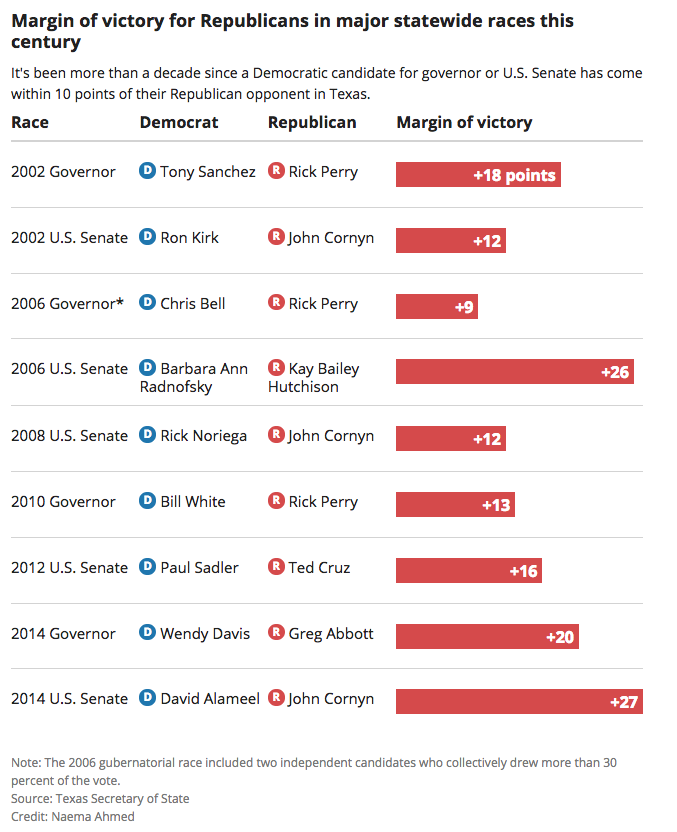
It's the most backhanded of compliments.
U.S. Rep. Beto O'Rourke‘s campaign for U.S. Senate has caught so much fire throughout the state that the new favorite betting game in Texas politics is "How close can he get to Ted Cruz in November?"
The implication in the question’s phrasing is that O’Rourke’s loss remains a given.
Despite the high enthusiasm the El Paso congressman’s campaign has drawn among Democrats, Texas has not elected a Democrat statewide in over 20 years. An informal round of interviews with well over a dozen political players involved in Texas and national politics suggests that Cruz is expected to extend that streak with a re-election victory in the high single digits.
While such a margin would amount to significant progress for Democrats from past statewide performances, a loss is a loss and Cruz’s win would likely ensure GOP control of the U.S. Senate for another two years.
Even so, O’Rourke’s 18-month statewide tour could still help significantly rebuild a flagging state party apparatus. The term being thrown around quietly among Democrats is "losing forward."
In that sense, the stakes are much higher for both parties than a single race.
How this very strange match up of Cruz, a former GOP presidential runner-up, against O’Rourke, a rank-and-file-congressman-turned-political-sensation shakes out could set the trajectory of the next decade in Texas politics.
“Not an ordinary cycle”
The latest sign of O’Rourke’s momentum came over the weekend, in the wake of Cruz releasing several television ads Friday, including three attacking O’Rourke.
"The biggest challenge I have in this race … is complacency," Cruz said Saturday at a conservative conference in Austin. "People say all the time, ‘Oh, come on, it's a Texas re-elect. How could you possibly lose?' Well, in an ordinary cycle, that might be true. But this is not an ordinary cycle.”
O’Rourke’s campaign, meanwhile, set an ambitious goal of raising $1 million over the weekend to help counter Cruz’s attack, and easily blew past that target, announcing Monday morning it had raised more than $1.25 million through more than 30,000 donations.
More than one operative from both parties brushed off the O'Rourke excitement with a pervasive phrase — "This is still Texas" — a nod to the state’s recent history as the most populous conservative powerhouse in the union.
The enthusiasm for O'Rourke — his bonanza event attendance and record-breaking fundraising, in particular — is something the state has not seen in modern memory. But there remain open questions over whether the three-term congressman can take a punch when the widely expected fall advertising blitz against him begins, whether he can activate the Hispanic vote and whether he can effectively build his name identification in a such a sprawling and populated state.
“We've never been in a situation where November matters at a statewide level,” said Jason Stanford, a former Democratic consultant, about the uncertainty of the fall.
So what would a moral victory be, if O'Rourke is unable to close the deal outright? Operatives from both parties suggest a five- to six-point spread — or smaller — could send a shockwave through Texas politics.
Such a margin could compel national Democrats to start making serious investments in the state and force local Republicans to re-examine how their own party practices politics going forward.
But that kind of O’Rourke performance could also bear more immediate consequences, potentially scrambling the outcomes of races for other offices this fall.
Only a handful of statewide surveys on the race are floating around the Texas political ether. But one increasing point of alarm for Republicans is what campaign strategists are seeing when they test down-ballot races.
Often campaigns for U.S. House or the Texas Legislature will include statewide matchups in polling it conducts within a district. Sources from both parties say some of those polls show Cruz underperforming in some state legislative and congressional races — particularly in urban areas.
In effect, O'Rourke could come up short but turn out enough voters in the right communities to push Democrats over the line in races for the Legislature and U.S. House.
Cruz’s pollster, Chris Wilson, countered that Cruz’s coattails are an ideal for turning out the party’s base.
“What Cruz does that is unique from what any other statewide official can do — it’s to motivate the presidential-year voters to turn out,” he said. “He's a candidate who engenders enthusiasm among the Republican base. It would be myopic to think the Republican base would turn out without someone like him on the ballot.”
Former Lt. Gov. Ben Barnes, a Democrat, pointed to the other race at the top of the ticket — Gov. Greg Abbott‘s bid for re-election against Democrat Lupe Valdez — which is expected to be a blowout given Abbott’s popularity. While that arguably makes O’Rourke’s task even harder, it could force habitual straight-ticket Republicans to split their votes between him and Abbott. Barnes argues such a scenario could open the door for Texas voters in GOP strongholds to consider Democrats for races down ballot.
“It's pretty dismal, the chances of a Democrat, but I think Beto has done a good job in maybe changing the politics of rural Texas,” he said. “He will run a good campaign and get a lot of votes. I think Beto is going to make people split their tickets.”
Moving the goalposts
Ironically, those most wary of this chatter about O’Rourke’s potential are some of his fellow Democrats.
Since Republicans took control of the state government in the 1990s, a new statewide Democratic candidate has burst onto the scene every few years, drawing the mantle of the party’s new great hope. And repeatedly, that candidate has come up far short.
Former state Sen. Wendy Davis' campaign was the latest incarnation of this in 2014, and her 20-point loss did much to dampen future enthusiasm and fundraising in the state.
Since 2002, a series of Democrats running for governor or U.S. Senate garnered similar hype and sometimes, money, for bids aimed at breaking the party’s statewide drought. They include former Houston Mayor Bill White and banker Tony Sanchez – both of whom lost bids to unseat then-Gov. Rick Perry – and former state Rep. Rick Noriega and former Dallas Mayor Ron Kirk — both of whom lost to current U.S. Sen. John Cornyn. Most lost by double digits.
For Democrats, it's a nightmarish lather, rinse, repeat of loss. In recent years, many shifted their focus to low-level races with an aim to build the party’s bench for the future.
And then came O’Rourke, who seemingly out of nowhere has prompted the kind of excitement and expectations that some Democrats now fear are once again doomed to lead to disappointment.
But whether these Democrats like it or not, the goalposts have already moved.
One national Democratic consultant who is involved in Texas races suggested that simply doing better than Davis' 2014 performance against Abbott is not enough — any O'Rourke loss in the double digits would significantly deter any potential enthusiasm among national Democrats that Texas could be competitive at the statewide or presidential level in the near future.
There is also some clear anxiety about the U.S. Senate race in some Republican circles, but it’s not as widespread.
Some GOP insiders — even those who are not keen on Cruz — shrug off any scenario in which this race could portend a long-term threat to Texas Republican power.
While Cruz had a difficult landing after his failed presidential bid, confidence remains high that he will run a technologically organized campaign on par with his presidential and 2012 Senate campaigns.
At the same time, Abbott and Lt. Gov. Dan Patrick are postured to tap their hefty war chests to provide tens of millions of dollars of support to the rest of the ballot.
But also, in this Republican worldview, these two Senate candidates are too unique and, with Donald Trump in the Oval Office, the times are too tumultuous to extrapolate any grand prognostications of the future of Texas politics. Cruz is a uniquely polarizing force in state politics, while O'Rourke has proven so far to be a Democrat with rare charisma.
A better barometer, these Republicans argue, is how Cornyn performs in his widely expected bid for re-election in 2020.
And even if O'Rourke pulls off an historic upset, many caution against any sweeping conclusions that Texas will become a central battleground in national politics. Back in 1961, John Tower defied low expectations in a special election for U.S. Senate, becoming the first Republican to win a statewide seat in Texassince Reconstruction. The GOP’s path to eventually sweeping every statewide office would take another 37 years.
In that regard, some Democrats view any talk that an O’Rourke loss by a certain number of points could be spun into a long-term victory as absurd. For them, this remains a zero-sum game.
“The only winning is winning,” Stanford said.

 75 °F
75 °F
